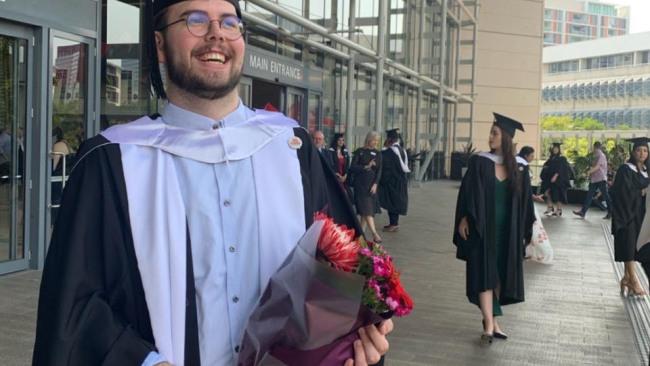Why now is the right time for a career shift
After years of studying, Liam Jackson was enjoying stability in his role as a paediatric nurse. Then COVID-19 hit.

Education
Don't miss out on the headlines from Education. Followed categories will be added to My News.
2020 has been a catalyst for thousands of career changes.
After graduating from his Masters in Paediatric Nursing, Liam Jackson was sure he was done with study, at least for the foreseeable future.
But less than a year into his career, COVID-19 hit, and life in the hospital changed completely.
Before the pandemic, Liam was working on the cancer ward of the Westmead Children’s Hospital. Not only treating patients, Liam’s days involved a lot of work with the families, something he particularly enjoyed.
“Children would come in for numerous reasons. Back then, the whole family could come and visit them at the same time.”
He said the early days of COVID-19 were chaotic, but the hospital implemented one clear change quickly, which affected the families he worked with.
THE NEW NORMAL
“We couldn’t have too many visitors to the hospital. There was this new focus that we have to look after the kids that are already sick and receiving treatment, but we also had to be concerned about the pandemic.
“We still provided great care, but we had to change practices and provide treatments that are specific to working in a global pandemic.”
For Liam and his colleagues, the biggest challenge was the sheer pace of information coming in, especially in the early weeks and months.
“It was very hard - in the early months everything was evolving and changing. We had new information every day, and best practice would change every day.”
He said while he and his team followed directives from the Health Department, it was difficult to keep on top of the huge amount of information coming in, while still doing your job on the wards.
“It’s a lot to keep up with. It’s hard to ensure you’re providing the most current up to date care when the whole situation is constantly evolving.”
One of the biggest challenges those in the industry faced was the changes to requirements in wearing personal protective equipment (PPE).
“We had to learn how to put on the respiratory masks and everything like that. It was more the uncertainty - everyone had to have lots of education and support in terms of COVID.”
It was this need for extra education that saw Liam take his first steps towards a change of career.
A COVID-INSPIRED CAREER SHIFT
From his previous studies in infection control he knew he had the skills to help not only his colleagues, but the health profession more widely. Taking a role in addition to his clinical job on the ward, Liam started teaching health professionals in other settings, such as nursing homes.
“They often didn’t have access to specialised resources. So we tried to tailor (our courses) as best possible. It was very hard in some ways (the shortages of PPE). We had to make sure everyone was doing everything safely.”
The work was crucial. Each class was designed to empower students to do further research - as this could prevent COVID-19 infections in their own workplaces.
It was during this “side” role that Liam realised he wanted a more permanent career change.

RETURNING TO THE (VIRTUAL) CLASSROOM
He went back to Griffith University, and enrolled in a Griffith Professional short course designed to qualify health professionals to teach their peers.
“You learn teaching techniques. It’s an understanding of how adult learners learn, specific to healthcare workers.”
He said there’s a critical need for qualified health professionals to become specialised teachers.
“The healthcare industry is rapidly evolving, especially if you chuck in a global health pandemic - you can never stop learning.”
Once qualified, Liam hopes the combination of his clinical and classroom experience will land him a permanent role in health education.
“Hopefully I’m able to get a more formal nurse education type role that I could combine with the clinical side too.”
For people thinking of a COVID-inspired career change, Liam believes enrolling in a Griffith Professional short course is a good first step.
“Griffith offers it all online. So you can log in whenever you want. And all the lectures are recorded. Everything is all there for you to go at your own pace.”
He said having the extra support from his teachers was important, especially with all classes now online.
“You’re not on your own. The tutors and the lecturers are always available. You can email or ring them. Because it is a postgrad course, it’s expected that a majority of the people (studying) are working in some capacity.”
He added having that flexibility is important, especially when people are juggling multiple parts of their lives at once, with courses lasting between 6 and 12 weeks.
“They are very understanding of stuff that happens in work and in life, and you’re able to get extensions if needed. They can personalise your approach to learning which is good.”
Liam believes that while the healthcare industry was one of the ones most affected by changes in COVID-19, other professionals should take the time to reconsider the next stage in their careers at this time.
“It’s something worthwhile looking into. If I can do it - being a healthcare worker in a pandemic - others can do it too. It’s always important to keep your skills updated, and make sure that whatever industry you’re working in that you’re doing the best job that you can do.”
This is article is brought to you by Griffith University.



